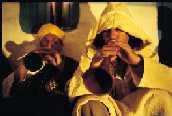Sacred Music: Introduction
Music is an excellent and accessible way to explore the
sacred in many cultures. This assignment which I created many years
ago is a success every time I assign it. Students love music and
love to listen to music, so they are very receptive to learning about world
culture through music. I don't limit my musical selections to only
sacred music, although enough good sacred music exists that this could
be done. Another variation on this assignment would be to use only
sacred chant. I have presented the project as I assign it, but modifications
can be made to tailor the assignment solely to sacred music. After the
assignment, I list suggestions for types of music and artists to assign
and suggest some resources to benefit your students' study.
Sacred Music: World Music Project
This is a research intensive project designed
to expose you in depth to forms of music and groups of people unfamiliar
to you. You will be expected to put a lot of time into this, and
to go as deeply as possible.
The following are guidelines for your presentation/research.
Do not treat this as a questionnaire and do only what it says. One
mark of the scholar is the willingness to push research further than originally
anticipated. I expect you to amaze me with what you find and what
you do to find it.
Geographical Overview
Provide a concise overview of the area from which
the music comes. (max. 3 minutes) 10% of grade
***Geography: remote, suburban, urban,
other?
***Culture, economy, religions, distant
or recent history having an effect on the people?
***Climate, ecological factors, etc.?
***Relate these elements to the development
of the music.
***What is currently happening in this
area? Use recent periodical articles.
Overview of Music
An informed and well researched overview of the
type or style of music you're assigned. (50% of grade)
***What are the features of the music?
***What are the roots of the music?
How did it evolve? What is the history of this type of music in this
area?
***Does the music have a purpose in the
culture?
religious/celebratory/mourning/entertainment/political/other
***What factors influence(d) the development
of the music over the course of history and today? (Relate to number
one above.)
***What are the features of the construction
of the music? (Including, but not limited to, melody, tempo, rhythm, vocals,
movements, harmony, etc. Watch especially for elements of the music
that do not exist outside that music or within Western music.)
***What instruments are used to create the music?
What are the origins of them, how are they related to other instruments
in the culture and other cultures? Are there any mythological, legendary
or ancient origins attributed to the instruments? How are they played?
What are the physics involved? You could also make, borrow
or somehow get a chance to play some instrument(s) and demonstrate/report
on that.
***What is the time frame of this type of music?
Ancient? Modern? How, if at all, has this affected the music? What
music(s) have developed from this music or has this music developed from?
***Is the music written or memorized?
***Is the music performed by both men and women?
If not, what is the basis for the exclusion? Do men and women have different
roles in the performance/study of the music? Are both men and women
present for the performance of the music?
Effects of Music
Explore the way the culture of the people has
influenced the music and the music has influenced the people. (10% of grade)
***How is the music experienced within
the culture?
***How have religion, politics, society,
ethnicity, gender affected the music? Watch for conflicts between
groups that have had an effect.
***Where is the music played? Markets?
Clubs? Churches/temples/etc.?
***How is the music regarded within the
culture? Social status? Respected/not respected?
***How are the musicians' economic situations
impacting the music? (For example, how do they deal with a
lack of money? By building their own instruments? By improvising
new instruments?)
Musical Selections
Select and play a minimum of three selections
of music--at least 2 minutes each. (20% of grade) In the first few minutes
of your presentation, play at least a small sample of the music to introduce
the class to the type of music your presentation revolves around.
As you play sections of other songs, highlight for the class the various
elements in the songs which exemplify the characteristics of the music
you've previously mentioned. This choice of song(s) must be made
carefully: you may not use more than 5 minutes (approx.) for only playing
music. Make an edited tape of selected sections of the music, so you don't
have to fast forward and get lost while we wait.
The other 10% of your grade will be based on how
well you present the information. Eye contact, organization, tone
of presentation, volume, speaking vs. reading will all count in this area.
Some suggestion on researching this project:
1. Start early. You may need to visit more
than one library in order to find the sources you need.
2. Search through the computers under the name
of the artist, the type of music, the country, the name of the album, the
record label, the religious/social/whatever environment the music comes
from. Be aware that different spellings exist for the artists or
types of music.
3. Investigate books on music in general.
They may make references that will be useful, and may in fact contain info
that you need, even though the card catalog doesn't list the book under
that subject. The Nazareth library has an excellent resource, The
Grove Muisc Encyclopedia, a multi-volume set of reference books.
I also have a small selection of books on world music available in
my room. You may not remove the books but you can use them before
or after school.
4. Search in computers for periodicals, especially
music reviews and concert reviews.
5. Try the encyclopedia--most countries' music
can be found in electronic encyclopedia.
6. Use the internet. There are newsgroups for
all sorts of music, such as African, Arabic, world music, etc., etc.
You can post questions to these groups and people will generally help you
out with titles to look for, explanations of concepts, etc. Web browsing
is also highly profitable.
7. Use college libraries and specifically music
libraries. Some colleges have these, and some don't.
Make some calls.
8. Talk to the librarian if you get stuck.
Also talk to him/her to see if there is anything you didn't think to look
for, even if you found some stuff. They really are there to help
you.
9. Get on the phone and talk to experts.
There are organizations for world music in most cities, there are experts
in college music departments, there are people in ethnic music stores,
there are musicians.
10. Research has been done on all the musics
I've given out. The info is out there. I know; I checked.
Your job is to find it. Very few excuses are valid.
11. Use the liner notes from the CD/tape as a
source.
12. See me the instant you get stuck.
13. I have many books, magazines, and videos
that may assist you. I will loan them to you for a day at a time.
See me after school to see if I have anything that relates to your topic.
Suggestions:
As a group:
--You will need to hand in a detailed outline*
(which I'd be happy to look at early if you aren't sure you're going in
the right direction), a bibliography (six sources required minimum), copies
of all your sources, and five possible test questions based on your presentation
and what you would want people to have learned from you. These won't
be accepted unless they are challenging, thoughtful and worthwhile.
Short answer/essay/ID. (*By outline, I mean a detailed and developed
outline that illustrates through preparation. Everything you do in
your presentation should be in your outline, including the music selections.)
--Work together.
--Practice. It is very easy to tell when
presenters are doing it for the first time, and your graded will reflect
your preparation. Don't exceed your time limit, which is twenty minutes.
--Listen to your tape the whole way through more
than once. It is obvious when you aren't familiar with the music.
As individuals:
--You will turn in, with the other materials,
a list of your contributions to the project. Keep track of this.
--Communicate with your partner as often as possible.
Where you feel stuck, he/she might have an idea.
A few other things:
--Be creative and engaging. Your job is
to teach what you know, so make it accessible. If you are bored, so are
we. Make it interesting.
--Do not read your presentation. This is
a sure way to get a low grade.
--Listen carefully to each other. Your
other job is to learn, and brains don't get full.
--Put key terms on the chalkboard before your
presentation begins.
--Visual aids are always useful, as long as they
advance your points.
--More pointers may come at any time, and details
of the assignment may have to change.
This presentation is worth 200 points=80 individual
and 120 group. The presentations will be scheduled the last weeks
of the 3rd quarter. All group members must research and present in
order to receive points.

Sacred Music: Suggestions for Music
The types of music that are followed by an asterisk are considered
sacred, all or in part, by the musicians who perform it. The rest
are considered world music or roots music that could be used for the project
without an emphasis on the sacred.
| Master Musicians of Jajouka (Morocco)* |
Flamenco (Spain) |
| Son (Cuba) |
Koto (Japan) |
| Sufi (Turkey, Middle East)* |
Carnatic (India)* |
| Rom/Gypsy (Eastern Europe) |
Slack Key Guitar (Hawaii) |
| Shakuhachi (Japan) |
Throat Singing (Tuva/Mongolia)* |
| Gamelan (Java and Bali)* |
Gnawa (Morocco)* |
| Hindustani (India) |
Klezmer (Jewish Eastern Europe)* |
| Zydeco (New Orleans) |
Reggae (Jamaica)* |
| Qawwali (Pakistan)* |
Aboriginal Music (Australia)* |
| Buddhist Monastic (Tibet)* |
Classical Persian (Iran) |
| Juju (Nigeria) |
Afrobeat (Nigeria) |
| Mambo (Cuba) |
Samba (Brazil) |
| Andean (Peru,Chile)* |

Sacred Music: Resources
The best links on world music--University of Washington's ethnomusicology
pages.
http://www.lib.washington.edu/music/world.html
Other university ethnomusicology sites.
http://echarry.web.wesleyan.edu/ethno.html
http://www.ualberta.ca/~slis/guides/music/mandj.htm
Two magazines about folk and roots music around the world.
http://www.frootsmag.com/
http://www.rootsworld.com/rw/
The Center for World Indigenous Studies
http://www.cwis.org/
The Smithsonian's Folkways Institute page.
http://lcweb.loc.gov/folklife/other.html
Sound and Spirit, a public radio program, did a show on sacred chant,
here's the playlist.
http://www.wgbh.org/wgbh/pages/pri/spirit/season7/729play.html
Cultural Survival, an organization dedicated to education about indigenous
peoples, has good background info.
http://www.cs.org
|